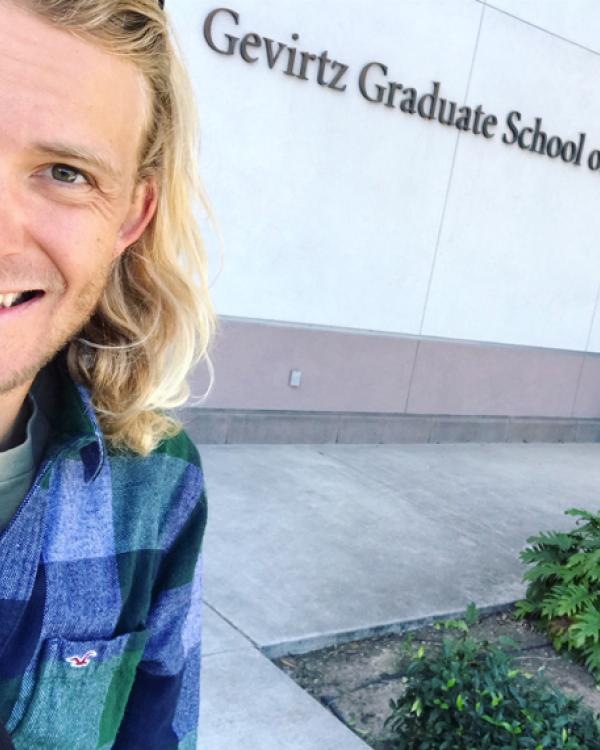
This week we caught up with Department of Education doctoral student Matthew Shackley. Shackley's advisor is Dr. Julie Bianchini, and he is pursuing emphases in Science Education and Cognitive Science. He received a B.S. in Biological Sciences from the University of Nevada, Las Vegas in 2014 and a M.S. in Teaching and Learning from Colorado State University in 2017. His research interests are borne out of a belief that improved scientific literacy across the population is vital to addressing social, economic, and environmental issues in the 21st century. He is particularly interested in culturally relevant models of science education as and for participation in community activity.
GGSE: You've already been a middle school science teacher. How did that experience motivate you to get a PhD in Education?
Shackley: My decision to pursue a PhD in education was shaped by my experience as a teacher in both public and private schools. I began my career as a long term substitute in a remedial science course for credit deficient seniors at a Title 1 high school in Las Vegas, NV. I’d majored in Biology as an undergraduate and had no formal teacher training at all. I learned pretty quickly that the teacher-centered lecture approach to education that had been a mainstay of my own education wasn’t going to work in that context. Instead, I took the time to get to know my students and to understand their plans for the future. These students were taking this course because they’d never been successful in science in the past, so I worked hard to show them that it was not only relevant to their lives and goals but also accessible in terms of future careers as well as in their every day lives.
After getting my teaching credential, I spent the last two years teaching middle school science at a private school in Las Vegas. To my surprise, I encountered many of the same barriers regarding student perceptions of the inaccessibility and lack of relevance in science curriculum in this job. Thankfully, I had a great deal of autonomy to shape my curriculum and employed a student-centered, project-based approach to teaching science, which connected the phenomena we were talking about to local desert ecosystems and geological sites. I was inspired to come to GGSE to pursue my PhD because I think science education as a whole is not adequately inspiring diverse students across all contexts. I’m looking forward to finding ways to help all students begin to see science as relevant to their every day lives and future goals, regardless of whether they see themselves as future scientists or not.
GGSE: As a first year student, what made you choose UCSB's Department of Education for your studies?
Shackley: I applied to a number of different programs last fall, and at the time GGSE was definitely near the top of my list. There are some incredible professors here, doing groundbreaking work. I was particularly interested with my now advisor, Julie Bianchini, who has done a lot of great work in the area of science identity. I’m not going to lie, the location was definitely alluring too. My wife and I love the outdoors and had visited Santa Barbara a number of times previously. She loves the surfing here and I enjoy the great road cycling scene! Having said all of that, it was my experience at Admit Day that made up my mind that this was the place for me. While the academic opportunities are important, I think it’s important to feel at home. At Admit Day I met so many wonderful people who were current GGSE students, as well as other admitted students who’d become my cohort. There was an air of positivity and collaboration here that I hadn’t felt anywhere else. I accepted my spot in the program the very next day!
GGSE: If you could tell everyone one thing about science education, what would it be and why?
Shackley: Everyone is a scientist! Human beings are naturally curious and use the gift of reason to explore and make sense of the world around us. Think of a baby crawling around exploring her environment, trying out different uses for different objects and making note of what works and what doesn’t. Unfortunately, formal education has sometimes had a knack for squashing this natural curiosity. There’s some great work happening here at GGSE to reimagine science education in a way that makes it accessible to all students, and helps them harness their natural rationale and curiosity to positively impact their community.
GGSE: What do you like to do when you have any free time?
Shackley: I mentioned it briefly above, but I’m an avid cyclist. I grew up playing all kinds of sports, but started riding and racing road bikes when I was about 15. I was lucky enough to travel around the country racing in some of the top professional races for a while during my late-teens and early-20s. I now mostly just ride for fun, although I still like to jump in local races on occasion. I also love a good adventure! This summer I rode the entirety of the Pacific Coast from the Canadian to Mexican borders. I’m hoping I’ll be able to find some time to plan another adventure like that in the next couple of years.
When I’m not working or cycling, I like to spend time with my wife. She picked up her whole life to move out here with me to a place where we didn’t know anyone or have any family. I can confidently say I wouldn’t be here without her! We enjoy going to beach, exploring our new home, and occasionally staying in to watch and cheer on our hometown hockey team, the Vegas Golden Knights!